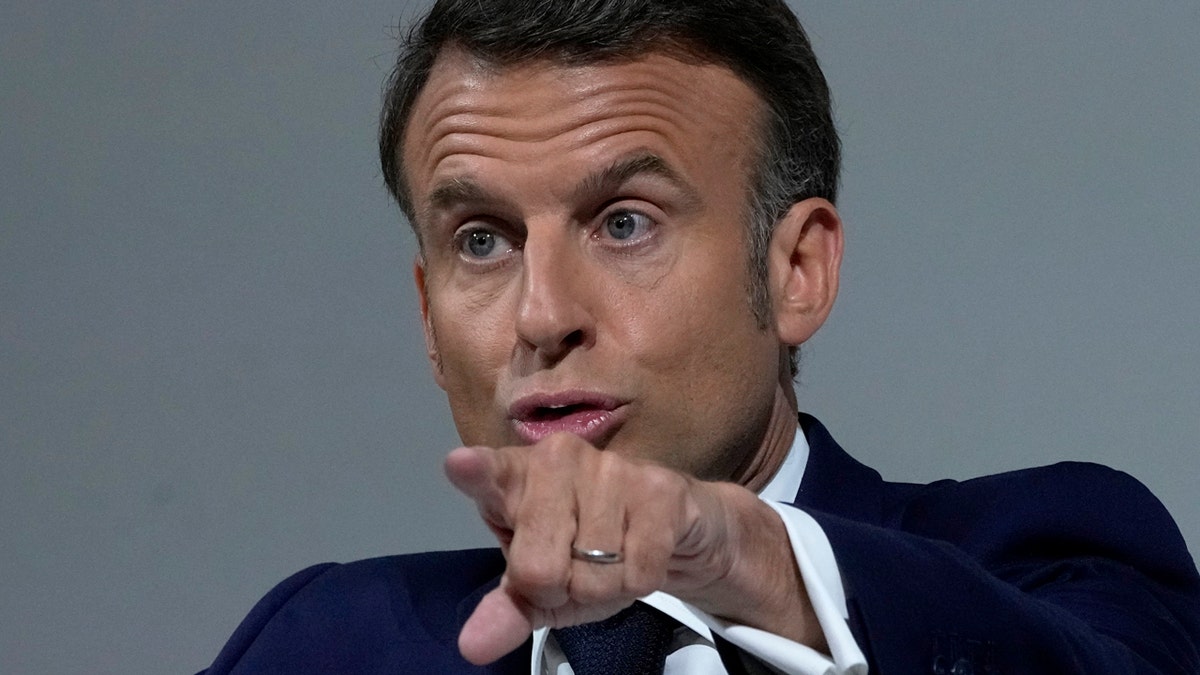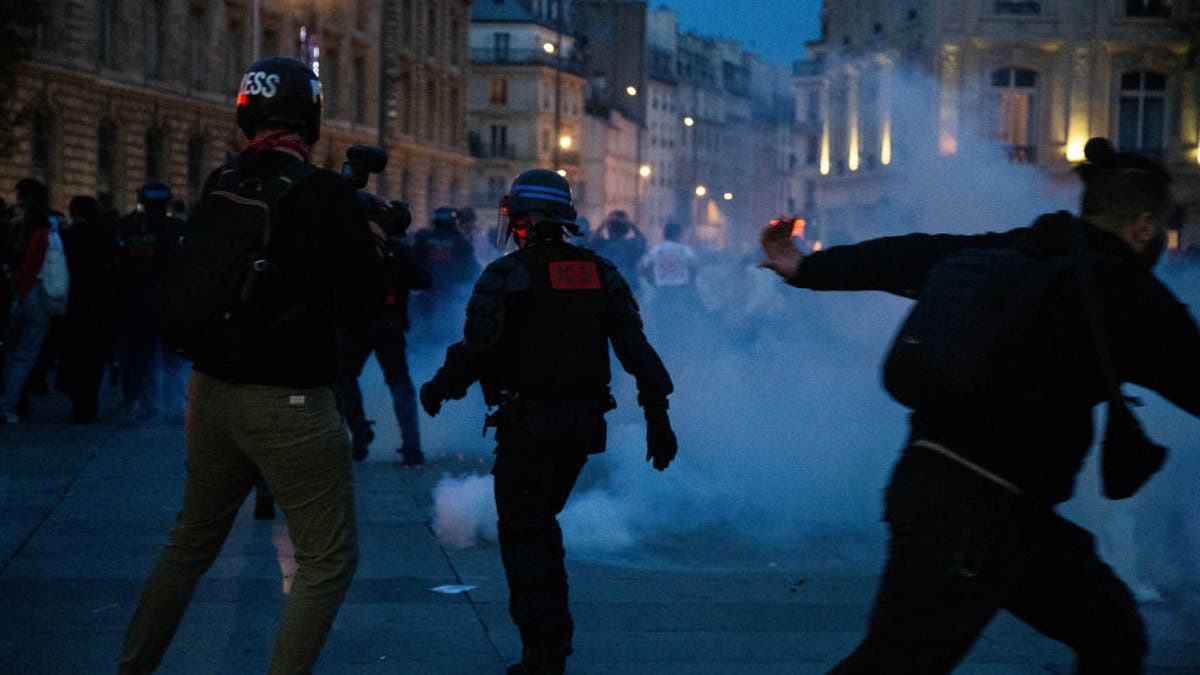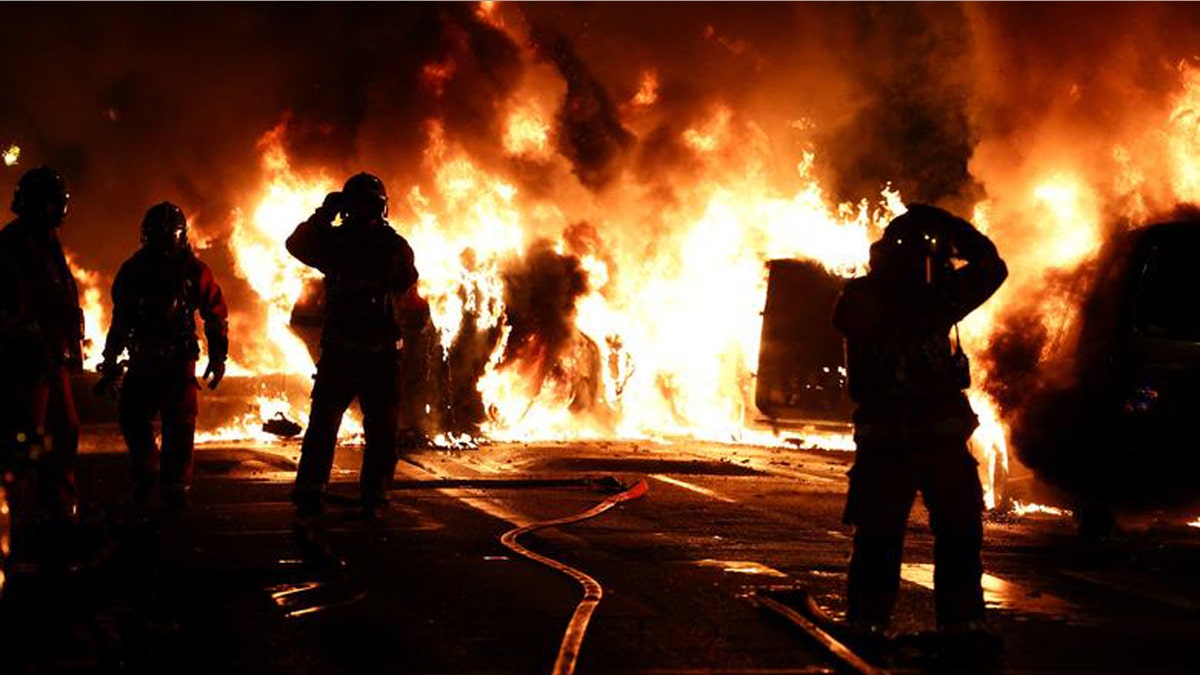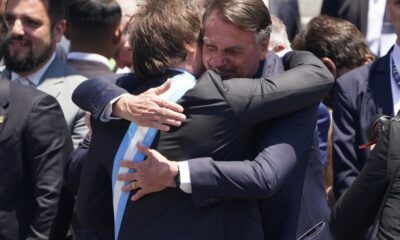INTERNACIONAL
French right in commanding position as 'fed up' voters prepare to send Macron message in elections

FRANCE – When the French go to the polls this Sunday, the result will likely reflect an unprecedented move to the right in what could lead to the most conservative parliament since the country was liberated in WWII, experts say.
The reasons come down to unhappiness with immigration, a weak economy, a cost-of-living crisis and dissatisfaction with the current centrist government, especially among younger voters.
«Right now, France is seeing its biggest shift to the right,» Matthew Tyrmand, adviser to conservative political candidates and parties across Europe told Fox News Digital. «This is democracy at work-the people are mad as hell and not going to take it anymore.»
RIVALS BLAST MACRON FOR FEARMONGERING AFTER FRENCH PRESIDENT WARNS ‘CIVIL WAR’ ON HORIZON
Marine Le Pen, President of the National Rally group in the National Assembly, joins Jordan Bardella, President of the National Rally (Rassemblement National), at the final rally before the recently held European Parliament election on June 9th (Photo by Artur Widak/NurPhoto via Getty Images) (Artur Widak/NurPhoto via Getty Images)
Tyrmand continued, «The people of France are fed up with their cloistered Parisian leadership living high on the EU hog while their cities burn, youth unemployment remains high, crime continues to rise, racially motivated attacks and violence on native French persists.»
It’s the same factors that led the right-leaning National Rally to win 31.4% of the votes, the largest share of any French party in the European Union elections earlier this month. That National Rally, which was founded by Jean-Marie Le Pen in 1972, has reinvented itself over the past few years under the leadership of Le Pen’s daughter Marine, and now aided by the 28-year-old president of the party, Jordan Bardella.
Unfettered immigration, which totaled more than 320,000 last year plus undocumented migrants, has many French voters worried. «It’s more to do with instability and violence than about immigrants taking away jobs from the French,» says Leo Barincou, a Paris-based senior economist for Oxford Economics. «You have crimes that made headlines that were immigrant-related; That’s what’s pushing the rejection of immigration.» Some of those events included terrorist attacks, murders and assaults. Another factor swaying voters against more immigration is the cost imposed on taxpayers for social benefits,» he told Fox News Digital.
FRENCH RIVALS MACRON, LE PEN DECRY JEWISH GIRL’S GANG RAPE AS ANTISEMITIC ATTACK SENDS PRE-ELECTION SHOCKWAVE

French President Emmanuel Macron delivers a speech, Wednesday, June 12, 2024, in Paris. President Emmanuel Macron is addressing French voters on Wednesday for the first times since he has called snap national election following a crushing defeat of his party by the far-right in the European vote. (AP Photo/Michel Euler)
The threat of violence may be one of the factors driving younger voters to demand deportation of some immigrants. There’s been enough passion around this topic to prompt some musicians to make a song distributed on social media sites that’s become popular among Gen-Z, people aged 11-26. Lyrics include «I won’t leave, Yes, you will leave. And sooner than you think.»
The economy under Emmanuel Macron’s centrist party hasn’t done well either. The cost-of-living crisis following the invasion of Ukraine sent inflation to 6.3% in February last year and subsequently fell to 2.1% recently. Youth unemployment remains at double-digit levels. Plus, the level of home building has trended lower over the last decade, making it more expensive for young people to rent. «If you have a cost-of-living crisis, whoever is in charge will bear the cost of that,» says Konstantinos Venetis, director of global macro at TS Lombard in London. «Inevitably, when you get complaints from voters, then whoever is waiting to come into power will have an advantage.»

Rassemblement National (RN) President and electoral list leader, Jordan Bardella poses for a selfie with supporters during a campaign rally for the European elections in Montbeliard, eastern France, on March 22, 2024. (Photo by PATRICK HERTZOG/AFP via Getty Images) (Photo by PATRICK HERTZOG/AFP via Getty Images)
However, Venetis notes that France’s economy is certainly no worse than other major European Union countries, such as Germany and Italy, and maybe even better than those. «This year is supposedly the year that the economy is going to bottom out,» he says, meaning that economic growth looks set to improve. He says that’s likely to be powered by more government spending, perhaps even at an EU level.
Still, many younger voters and those who live in rural areas voted heavily for National Rally in the EU election earlier this month, and there would seem to be little reason to expect a different result this time. «There were very few places where the far right wasn’t first,» Barincou said. The places that weren’t right-leaning included Paris, which fits with a long-standing narrative that people who work in professional jobs in large urban cities tend to take a progressive political stance, he says.
AT 28, JORDAN BARDELLA SHAKES UP FRENCH POLITICS: ‘PEOPLE ACROSS FRANCE HAVE WOKEN UP’

French riot police use tear gas to disperse demonstrators during a pro-Palestinian rally at the Republique Square in Paris, France on October 12, 2023. (Photo by Ibrahim Ezzat/Anadolu via Getty Images) (Ibrahim Ezzat/Anadolu via Getty Images)
The likely passionate youth vote for National Rally may partly be driven by the youthful Bardella, who not only communicates his thoughts on TikTok but is also barely older than many in the Gen-Z cohort. «I am not too surprised he’s popular with younger voters,» says Marc Chandler, chief market strategist at Bannockburn Global Forex in New York told Fox News Digital. «I remember young people being excited about former president Barack Obama being one of the youngest U.S. presidents.»
A National Rally-led parliament, if it were to happen, would likely not lead to France leaving the EU or the single-currency Eurozone, Elias Haddad, a senior markets strategist at banking company Brown Brothers Harriman told Fox News Digital. «If the right wing come to power, the dynamics between France and EU will be a bit more complicated but not a threat to the monetary union,» he says.

Firefighters extinguish burning vehicles during clashes between protesters and police, after the death of Nahel Merzouk, in the Paris suburb of Nanterre, France. ( REUTERS/Stephanie Lecocq)
Meanwhile, Marine Le Pen looks like she’s planning for a win, suggesting that Bardella, as Prime Minister, should be involved with decisions on military defense. While nominally the French president is the head of the armed forces, the constitution states, «The prime minister is responsible for national defense.»
CLICK TO GET THE FOX NEWS APP
The French parliamentary system requires up to two rounds of voting. If one party doesn’t get an overall majority in the first vote, then the top two parties will battle it out in a second poll. The latter would occur on July 7 if required. As of Friday, polls suggested that National Rally could get 37% of the vote.
The Associated Press contributed to this story.
INTERNACIONAL
Elecciones en Francia: Bruselas respira aliviada tras la derrota de ultraderecha de Marine Le Pen

Un veterano diplomático confesaba hace meses: “La Unión Europea resistió una década de gobiernos de extrema derecha en Polonia. Resiste a la extrema derecha de Meloni en Italia y podría resistir una España de extrema derecha. Alemania está vacunada. Pero si cae Francia el bloque se paralizará, si no se disuelve”. La frase era entonces pesimista, cuando se creía que el Reagrupamiento Nacional de Marine Le Pen podría obtener los 289 diputados necesarios, en las elecciones del domingo, para exigir al presidente Emmanuel Macron que nombrara a su delfín Joan Bardella primer ministro. No sucedió.
No ocurrió porque el ‘frente republicano’ funcionó una vez más en Francia, la izquierda y el centro-derecha se votaron unos a otros para frenar a los candidatos lepenistas y el país tendrá, probablemente, un primer ministro de izquierda.
La mayor parte de las cancillerías europeas y las instituciones de la Unión Europea respiraron aliviadas la noche del domingo. Porque Francia es probablemente el país esencial en la Unión Europea (el único con armamento nuclear y su segunda economía) y porque con Francia los ultras hubieran sumado la minoría de bloqueo necesaria para paralizar los procesos legislativos en la Unión Europea.
El papel de Francia es esencial en las instituciones europeas. El bloque se mueve por el impulso franco-alemán. Sin Francia, Alemania pena para mover al resto. En Europa del este se mira a Francia como la potencia militar de seguridad en el lado occidental del continente, sobre todo después de la salida británica de la Unión Europea. Una Francia de Le Pen sería un aliado del Kremlin, un quintacolumnista ruso en Europa.
El resultado francés no sólo impide gobernar a los lepenistas, los envía a la tercera posición en la Asamblea Nacional francesa y los deja mal parados en el Parlamento Europeo, donde peleaban con los melonistas para liderar el nuevo gran grupo de extrema derecha.
Los de Meloni seguirán por ahora en un grupo más pequeño con la extrema derecha más presentable y los de Le Pen se irán al nuevo grupo que ha puesto en pie el primer ministro húngaro Viktor Orban, que reúne a todo el espectro ultraderechista, hasta los neonazis del Vlaams Belang flamenco y del FPO austríaco. Es un grupo, en su mayoría, con simpatías prorrusas con el que el resto de las fuerzas no negociará nada. Será la tercera fuerza de la Eurocámara, pero estará fuera de las mayorías.
«Se evitó lo peor»
Los mensajes enviados la noche del domingo a diplomáticos y funcionarios de varios países del bloque volvían con respuesta muy similares, que podrían resumirse en un “se ha evitado lo peor”.
Desde Bruselas se sabe que en Francia se viene ahora una fase complicada de gestión de unos resultados que dan por primera vez una Asamblea Nacional con tres grandes bloques, que deberá haber negociación y coaliciones, algo a lo que la mayoría de los países europeos están acostumbrados (hay tres partidos en el gobierno alemán, tres en el italiano, dos en el español, cuatro en el holandés, tres en el polaco, siete en el belga, por nombrar unos pocos) pero Francia no.
En las instituciones europeas se teme que Francia siga en un período de inestabilidad si Macron y la izquierda no logran acordar un gobierno estable para los próximos tres años, hasta las presidenciales de 2027, pero la sensación es de alivio porque los problemas tienen solución y la hipótesis de una Francia en manos de la extrema derecha se consideraba una amenaza existencial.
El resultado francés y el británico del pasado jueves, los dos con mayorías progresistas, muestran también que la supuesta ola conservadora que recorre Europa debe ser relativizada.
 El nuevo premier laborista británico, sir Keir Starmer. Foto: AP
El nuevo premier laborista británico, sir Keir Starmer. Foto: APDe nombrar Macron, como es previsible, un primer ministro progresista en Francia, cuatro de los cinco mayores países europeos tendrían jefes de gobierno salidos de la socialdemocracia: el socialdemócrata Olaf Scholz en Alemania, el socialista Pedro Sánchez en España, el laborista Keir Starmer en el Reino Unido y un socialista en Francia.
El domingo a la noche se alegraban incluso los conservadores que se niegan a sentarse con la extrema derecha, como el ex presidente del Consejo Europeo y ahora primer ministro polaco Donald Tusk, que escribió en X: “Entusiasmo en París, decepción en Moscú, alivio en Kiev. Suficiente para estar feliz en Varsovia”.
En algunos entornos en Bruselas preocupa que un gobierno de izquierdas sea más laxo en la gestión económica porque Francia es con Italia el enfermo europeo con un déficit público del 5,5% a final de 2023 y una deuda pública que ronda el 110% del PBI. Pero fuentes de esos ambientes entienden que la alternativa, los lepenistas, era mucho peor.
-
POLITICA2 días ago
Detuvieron a un hombre armado a metros del acto de Milei en San Juan
-
POLITICA2 días ago
En Brasil aseguran que el gobierno podría retirar a su embajador en Buenos Aires si Javier Milei ofende a Lula en su discurso en el encuentro organizado por los Bolsonaro
-
INTERNACIONAL23 horas ago
Elecciones en Francia: qué escenarios políticos se abren ahora tras el triunfo de la izquierda
-
POLITICA3 días ago
Caso Loan: incidentes en la puerta del Juzgado Federal tras la detención de Laudelina Peña
-
POLITICA19 horas ago
Caso Loan: la hija de Laudelina denunció sobornos y amenazas
-
SOCIEDAD3 días ago
Mundos íntimos. Vivimos medio siglo sin saber que éramos padre e hija: nos queda el presente y el porvenir para conocernos.




























